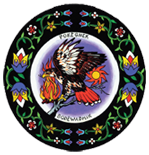Video Explains Federal Indian Child Welfare Act (ICWA) and its Intent.
This film, featuring Pokagon Band's Associate Justice Jill E. Tompkins (Penobscot), is the culmination of the ongoing collaboration between the Mississippi Courts, Child Welfare Agency, the Mississippi Band of Choctaw Indians, and various national resource centers specifically focused on educating non-tribal entities on the Indian Child Welfare Act (ICWA) and other issues related to Native American values. The video was developed by the Mississippi Administrative Office of Courts/Court Improvement Program in consultation with the National Resource Center on Legal and Judicial Issues and the National Resource Center for Tribes as an ICWA educational resource for judges, courts, child welfare, and judicial educators. The video is produced by Mad Genius, Inc., Ridgeland, Mississippi.
Tribal Courts and Families: Three Judges Discuss Native American Sovereignty and the Indian Child Welfare Act
Michael Petoskey, chief judge of the Pokagan Band Tribal Court, joined Theresa Pouley, chief judge of the Tulalip Tribal Court in Washington state, and William A. Thorne Jr., a Pomo/Coast Miwok Indian appointed to the Utah Court of Appeals, to discuss misconceptions about the Indian Child Welfare Act and the advantages of transferring child welfare cases from state to tribal jurisdiction. Click here to listen to the podcast, produced by a collaboration between the Center for Court Innovation and the National Council of Juvenile and Family Court Judges.
Indian Child Welfare Act of 1978: A Court Resource Guide was written by a special Michigan Supreme Court committee in 2011 to help Michigan judges learn about the federal Indian Child Welfare Act of 1978, the need for states to comply with the Act, and discuss its implementation in Michigan: Indian Child Welfare Act Resource Guide [PDF]
Justice and Professor Matthew Fletcher spoke at the National American Indian Court Judges Association (NAICJA) conference and looked back at NAICJA and Dean Getches’ study, Indian Courts and the Future. Here’s a link to the Professor Fletcher's paper: "Indian Courts and Fundamental Fairness: 'Indian Courts and the Future' Revisited"
Understanding Why ICWA Compliance is Important for Judges
( http://www.ncjfcj.org/understanding-why-icwa-compliance-important-judges)
In December 2011, with support from Casey Family Programs, the Lead Judges of the Model Courts Project met to better understand the reasons the Indian Child Welfare Act (ICWA) was implemented and the experiences of Native children in the child welfare system. The judges listened to powerful testimony from Native adoptees and a birth mother who experienced the loss of connection and culture through their experiences in the child welfare system. They learned about the history of child welfare in Indian country and systematic practices to purposely break up tribal families. These practices included removing thousands of Native children from their families and tribes, first by placing children in boarding schools far from home and for years at a time, and then later, through the Indian Adoption Project undertaken by the Child Welfare League of America and the Bureau of Indian Affairs, placing Native children in foster care for adoption by non-Native families. The legacy of these policies and their negative impacts on tribal communities and families continue today.
This testimony, along with presentations from tribal judges and other experts, helped the judges understand the importance of maintaining Native children’s connections to family, community and culture. Congress recognized the significance of these connections more than 30 years ago in the findings set forth in the ICWA.
With a deeper understanding of the impact of past governmental policies on Native children and families and a recognition that the ICWA’s vision of keeping Native children connected with their tribal heritage is still unrealized, NCJFCJ’s Model Court Lead Judges committed to improving compliance with the ICWA in their local jurisdictions. Commitment and partnerships from all involved in child welfare are required to achieve ICWA compliance.
Click here to watch the video from the December 2011 Lead Judges Meeting on the "History and Spirit of ICWA."
This video “History and Spirit of ICWA” provides juvenile and family courts with the historical context of Native Americans and child welfare. The goal of this video is to provoke discussion and to further the court’s understanding of why it is critical to ask if there is any Native American heritage at every hearing.
